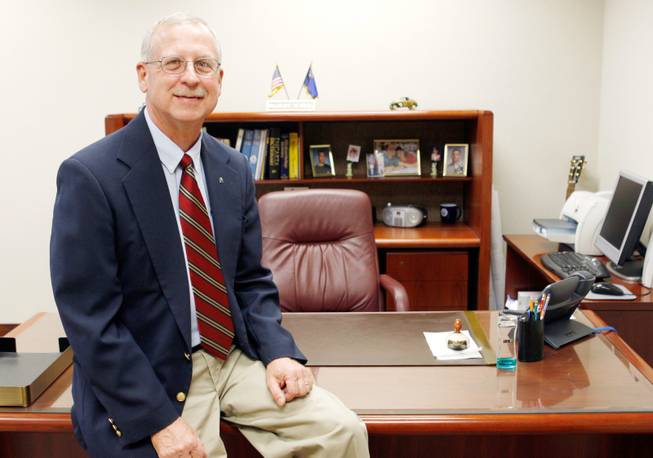
Brad Beal, president of Nevada Federal Credit Union, says mortgages are now good and bad for the business. Borrowers who bought when prices were high are defaulting, but many loans are being made to new buyers.
Tuesday, Sept. 29, 2009 | 2 a.m.
Sun Coverage
Brad Beal leads Las Vegas’ largest credit union, Nevada Federal, and for the past two years has served as chairman of the National Association of Federal Credit Unions.
Beal prefers credit unions’ nonprofit status, saying it allows his employees to focus on the members, rather than garnering profits. Despite the economy, Nevada Federal is growing — by 3.7 percent during the past year.
Financial institutions have been among the hardest hit during this recession. How do you see banks, credit unions and others recovering?
The recovery’s going to be very gradual. We will recover as our members recover, as we eventually see the unemployment rate start to come down and people go back to work.
Do you think other financial institutions will mirror that as well?
The banking industry is more business-focused, and so a lot of its recovery will be dependent on how the business economy recovers. Credit unions are more focused on the consumer side.
Nevada Federal is closely linked to the Las Vegas economy. Where do you see the local economy going?
We do not expect a rebound, a short-term bounce back to where we were in 2005, 2006, but rather a more gradual building of our economic base.
Once the national economy recovers and more consumers are willing to come to Las Vegas, as the convention business picks back up, we expect to see a slow and gradual recovery.
Nevada Federal reported an increase in its bad loans from $3.1 million the year prior to $16.6 million in the first quarter. What kind of loans are being defaulted on?
The defaults are primarily on first-mortgage loans, primarily made during the time period when home prices were very high.
The remedy to that situation, frankly, is our accumulated capital. The fact that we had accumulated well over $100 million in capital, that’s kind of the credit union’s rainy day savings account, and that’s coming in handy now to help us absorb these losses.
How has your business changed since the start of the recession?
Believe it or not, our first-mortgage business has been incredibly strong. We’re on track to be at or near a record for first-mortgage loans this year. Now is a great time to buy a home in Las Vegas if a person has a stable income and a little bit of down payment money.
We’ve also had a lot of demand for our financial education classes. They’re free and deal with very fundamental topics: How to manage your checking account, how to set up a household budget, what does your credit score mean and how can you improve it. That has been a very, very popular subject under the economic circumstances.
What is your response to bankers who say that credit unions should be restricted to the roles they’ve held in the past and not be allowed to expand services?
I don’t exactly know what they mean by saying that we should be limited to our role in the past. We’re doing what we’ve always done and that is meet the needs of our membership, and as those needs change and become more modern, we change with them.
Nicole Lucht covers health care, workplace, energy and banking issues for In Business Las Vegas and its sister publication, the Las Vegas Sun.

Join the Discussion:
Check this out for a full explanation of our conversion to the LiveFyre commenting system and instructions on how to sign up for an account.
Full comments policy